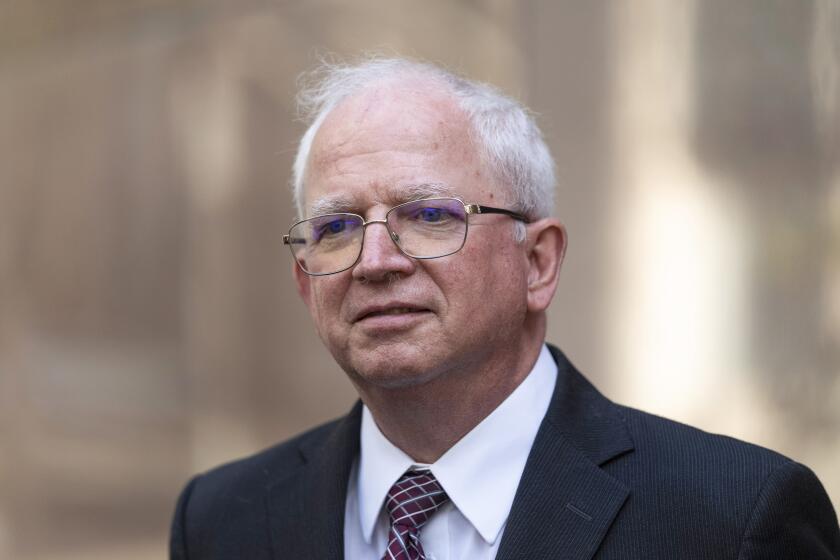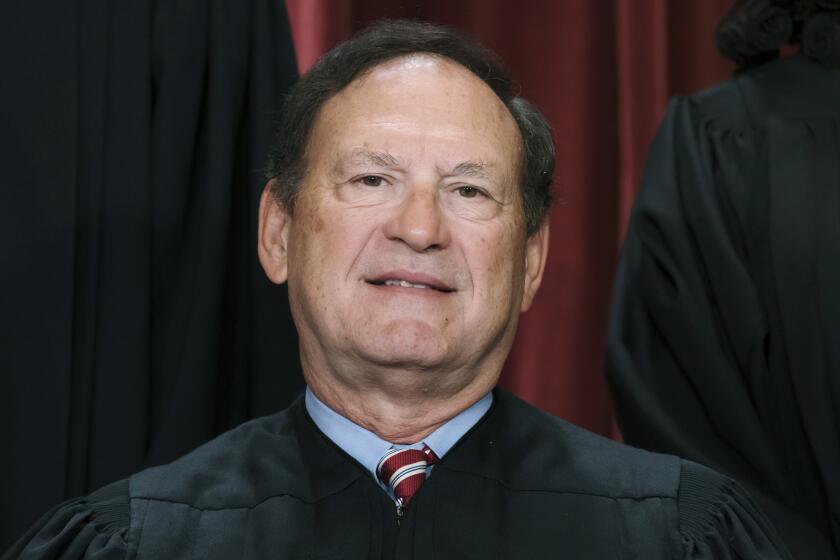Clinton Begins Mideast Mission : Diplomacy: President underlines support for peace with visit to Cairo tomb of slain leader Anwar Sadat. Today he will attend signing of Israel-Jordan treaty.
President Clinton opened a four-day diplomatic mission to the Middle East with a visit early this morning to the tomb of Anwar Sadat, the former Egyptian president whose dramatic trip to Jerusalem in 1977 eventually cost him his life but planted seeds of peace that now have borne fruit.
Speaking in the White House Rose Garden before leaving Washington, Clinton underlined the message he hopes his visit will deliver: “The United States stands by those who, in the words of the Psalms, ‘seek peace and pursue it.’ And we stand up to those who threaten to destroy the dream that has brought us to this historic moment.”
Half a day later, in the wee hours of the morning here, Clinton stood at attention accompanied by Egyptian President Hosni Mubarak--who assumed office after Sadat’s assassination in October, 1981--in front of a massive pyramid that Sadat built to honor the soldiers who died in the October, 1973, war with Israel. Clinton walked forward and, with head bowed, placed a wreath in front of the black stone marker that commemorates Sadat.
Administration officials said Clinton wanted to visit Sadat’s memorial to underline U.S. support for those who are willing to defy the odds and pursue peace, a theme that will be at the heart of the President’s travels here, starting with his first formal meeting--a session today with Mubarak and Palestine Liberation Organization Chairman Yasser Arafat.
U.S. officials, noting that Mubarak has played an important role as an intermediary between the Administration and the PLO leader, say they hope to use the meeting to influence what both the U.S. and Israeli administrations see as a key strategic decision that Arafat must make in the next several weeks: whether to side decisively with Israel in the battle against the Hamas extremist movement or to back away from such moves for fear of deepening the splits in the Palestinian community.
“Arafat is dealing with enormous political forces at work in his own movement,” said State Department spokesman Mike McCurry. Clinton, McCurry added, will compliment the PLO leader on what he has done so far to combat terrorists based in the Gaza Strip and the West Bank but also plans to ask him to consider “what more he can do.”
The President, McCurry said, hopes to deliver “a very firm message” that “there needs to be a concerted effort on the part of the international community to thwart and throttle” groups that seek to derail the peace process.
Clinton himself noted in his departure remarks how the stakes have increased as the peace process has moved forward.
“For all the progress toward peace--indeed, because of that progress--we have witnessed a new wave of terrorism and violence,” he said. “No step on this long journey requires more patience, more discipline, more courage, than the steps ahead.”
Arafat, for his part, told reporters as he arrived in Cairo a few hours before Clinton that he had “many issues to discuss” with the President. At the “top of things,” he said, were the PLO’s objections to what the Palestinians see as Israeli delays in implementing parts of the Israeli-PLO Declaration of Principles that the two sides signed in Washington just over a year ago.
Under the terms of the declaration, the Palestinians gained limited autonomy in Gaza and the West Bank town of Jericho, and elections were supposed to have taken place in July. But talks between the two sides on how to carry out the balloting have stalled.
Israeli and Palestinian negotiators completed another round of talks Tuesday without agreement. Israel has been pushing for rules that would exclude Hamas and other groups opposed to peace from putting forth candidates.
Arafat also objected to parts of the Israel-Jordan peace treaty, to be signed today, that give Jordan a role in administering Muslim holy places in Jerusalem.
“Jerusalem is the capital of the state of Palestine, whether they like it or not,” Arafat said in a speech to students at Al Azhar University in Gaza. “. . . I say to them that Jerusalem is not for sale.”
U.S. officials say they understand Arafat’s concerns, but they insist that the agreement between Jordan and Israel should not directly interfere with the PLO’s rights under last year’s peace agreement.
In the meantime, officials say, Clinton also wants to press Arafat to move more rapidly to establish true political institutions in the territories now under the control of his Palestinian Authority--a subject repeatedly raised by Administration officials in meetings with Palestinians.
U.S. officials have been concerned about the slow pace of converting the PLO from a movement into an entity capable of government.
Secretary of State Warren Christopher “sometimes sounds like an accountant” in meetings with Arafat, McCurry joked. “He’ll say: ‘Where’s your business plan? How do you plan to spend your money?’ ”
The meetings with Arafat and Mubarak are the opening moves in a grueling trip that will take Clinton through six nations--Egypt, Jordan, Syria, Israel, Kuwait and Saudi Arabia--before he returns to Washington on Saturday. The trip is the most extensive to the region by an American President since Richard Nixon traveled here in the summer of 1974.
In addition to witnessing today’s treaty signing, Clinton also plans speeches to both the Israeli and Jordanian parliaments, a visit to Israel’s Yad Vashem Holocaust memorial, a session with American troops in Kuwait and a meeting with Saudi Arabia’s King Fahd. The diplomatic highlight of the trip is expected to be a meeting Thursday with Syria’s President Hafez Assad.
Administration officials deliberately have downplayed expectations of any dramatic breakthrough coming out of the Assad meeting, but at the same time they say the Syrian leader is key to the final step in building peace between Israel and its Arab neighbors.
President Clinton’s Itinerary
Today: Meets in Cairo with President Hosni Mubarak and Palestine Liberation Organization chief Yasser Arafat. Flies to Aqabah on the Israel-Jordan border for the signing of a peace treaty between those two countries. Travels to Amman, the Jordanian capital, to address the Jordanian parliament and spend the night.
Thursday: Flies to Damascus, Syria to meet with President Hafez Assad. Then goes to Israel to meet with Prime Minister Yitzhak Rabin, hold a joint news conference and address the Knesset.
Friday: Flies to Kuwait to address American troops. Concludes trip in Saudi Arabia, where he meets with King Fahd.
More to Read
Get the L.A. Times Politics newsletter
Deeply reported insights into legislation, politics and policy from Sacramento, Washington and beyond. In your inbox three times per week.
You may occasionally receive promotional content from the Los Angeles Times.







